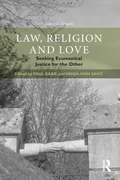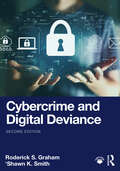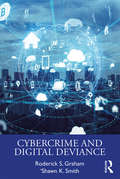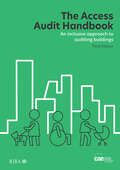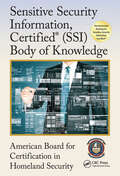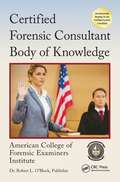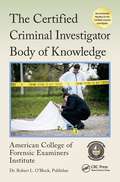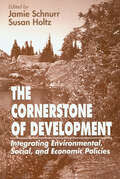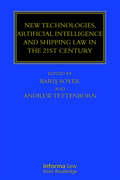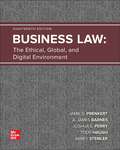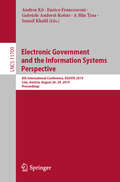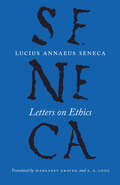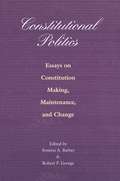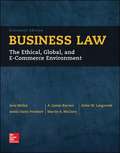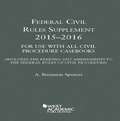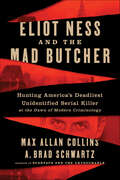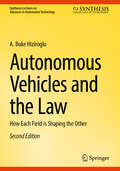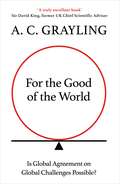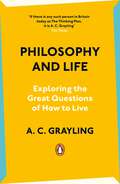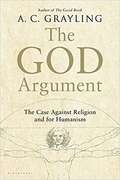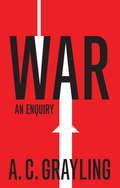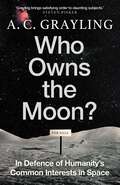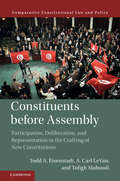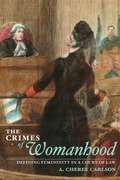- Table View
- List View
Law, Religion and Love: Seeking Ecumenical Justice for the Other (Law and Religion)
by Paul Babie Vanja-Ivan SavićIncreasingly, the modern neo-liberal world marginalises any notion of religion or spirituality, leaving little or no room for the sacred in the public sphere. While this process advances, the conservative and harmful behaviours associated with some religions and their adherents exacerbate this marginalisation by driving out those who remain religious or spiritual. And all of this is seen through the lens of social science, which seems to agree that religion remains important, if not in spiritual sense, at least as a source of folklore and a means of identification: religions remain rooted in the societies from which they emerged, and the legal systems of many of those societies emerged from religious sources, even if those societies remain unwilling to admit that fact. In the modern materialistic world of conformity, religion is less a source of guidance than a label of identification. The world therefore faces two issues. First, the decreasing level of spirituality in the ‘West’ widens the gap between worshippers and those who have left their faith (eg agnostics and atheists, or those who look at religion as a matter of ‘picking and choosing’ from a range of options). And, second, the strong connections to religion which remain in many nations, but which are often misused in the secular public sphere (both in the West and internationally). In such divided worlds, both religious and secular forces tend to lock themselves into closed groupings of ‘pure truth’ and in so doing increase the level of disagreement, in turn producing radicalism. In short, the modern world is divided in two ways: between religious and non-religious (although some have argued that the non-religious secular is itself a form of civil religion), and between those subscribing to divergent understandings of the same religious tradition. While hyperbolic and histrionic, the term ‘culture wars’ nonetheless best captures what we see happening in the public sphere today. The question emerges, then: how best to accommodate the democratic principle which posits that the majority should feel that it lives in a society of its own with the human rights principle, holding that is necessary to ensure the full protection of the minority’s rights? How to balance these seemingly opposed principles? We are very familiar with the differences that appear between secular and sacred in the modern world; yet, what of the similarities amongst scriptures and laws which seek to encourage mutual understanding, cooperation and even cohabitation? Because religion itself is a source of law, a set of exhortations or commands as much as a set of rights, every major religion offers an approach to encountering ‘the Other’ in a positive, constructive, affirming way; and it is here that religions reveal much that they have in common. This book draws together the work of scholars engaged in exploring the possibilities for a ‘utopian’ world in the sense fostered by St Thomas More. The essays explore those dimensions of religious and civil law where ‘love’ – however that is defined by relevant texts – fosters and encourages acceptance of ‘the Other’ and will offer perspectives on the ways in which religious or civil/state law command one to act in the spirit of ‘love’.
Cybercrime and Digital Deviance
by Roderick S. Graham 'Shawn K. SmithCybercrime and Digital Deviance, Second Edition, combines insights from sociology, criminology, psychology, and cybersecurity to explore cybercrimes such as hacking, identity theft, and romance scams, along with forms of digital deviance such as pornography addiction, trolling, and “canceling” people for perceived violations of norms.Other issues are explored including cybercrime investigations, nation-state cybercrime, the use of algorithms in policing, cybervictimization, and expanded discussion of the theories used to explain cybercrime. Graham and Smith conceptualize the online space as a distinct environment for social interaction, framing their work with assumptions informed by their respective work in urban sociology and spatial criminology, and offering an engaging entry point for understanding what may appear to be a technologically complex course of study. The authors apply a modified version of a typology developed by David Wall: cybertrespass, cyberfraud, cyberviolence, and cyberpornography. This typology is simple enough for students just beginning their inquiry into cybercrime, while its use of legal categories of trespassing, fraud, violent crimes against persons, and moral transgressions provides a solid foundation for deeper study. In this edition each chapter includes a new “Current Events and Critical Thinking” section, using concepts from the chapter to explore a specific event or topic like the effect of disinformation on social cohesion and politics.Taken together, Graham and Smith’s application of a digital environment and Wall’s cybercrime typology makes this an ideal upper-level text for students in sociology and criminal justice. It is also an ideal introductory text for students within the emerging disciplines of cybercrime and cybersecurity.
Cybercrime and Digital Deviance
by Roderick Graham 'Shawn SmithCybercrime and Digital Deviance is a work that combines insights from sociology, criminology, and computer science to explore cybercrimes such as hacking and romance scams, along with forms of cyberdeviance such as pornography addiction, trolling, and flaming. Other issues are explored including cybercrime investigations, organized cybercrime, the use of algorithms in policing, cybervictimization, and the theories used to explain cybercrime. Graham and Smith make a conceptual distinction between a terrestrial, physical environment and a single digital environment produced through networked computers. Conceptualizing the online space as a distinct environment for social interaction links this text with assumptions made in the fields of urban sociology or rural criminology. Students in sociology and criminology will have a familiar entry point for understanding what may appear to be a technologically complex course of study. The authors organize all forms of cybercrime and cyberdeviance by applying a typology developed by David Wall: cybertrespass, cyberdeception, cyberviolence, and cyberpornography. This typology is simple enough for students just beginning their inquiry into cybercrime. Because it is based on legal categories of trespassing, fraud, violent crimes against persons, and moral transgressions it provides a solid foundation for deeper study. Taken together, Graham and Smith’s application of a digital environment and Wall’s cybercrime typology makes this an ideal upper level text for students in sociology and criminal justice. It is also an ideal introductory text for students within the emerging disciplines of cybercrime and cybersecurity.
The Access Audit Handbook: An inclusive approach to auditing buildings
by (CAE) Centre for Accessible EnvironmentsOur buildings and environments should be inclusive to all, but how can we assess this? The Access Audit Handbook is an indispensable tool for auditing the accessibility of buildings and services. This book offers straightforward advice about undertaking access audits and explains how they make buildings, environments and services more inclusive. Following the audit, the book explains how each of the various report formats works best to communicate recommendations in the content of current legislation, funding requirements and best practice in building management. Well established as the best resource for conducting access audits, the third edition of The Access Audit Handbook is fully up to date with the latest legal and technical standards as well as developments in equipment and building maintenance. Featuring advice on: Commissioning an access audit Audit methodology Making recommendations Report writing The practical guidance is supported by case studies, worked examples and checklists.
Sensitive Security Information, Certified® (SSI) Body of Knowledge
by 0 American Board for Certification in Homeland Security"Sensitive security information (SSI) is a category of sensitive but unclassified information under the United States government's information sharing and control rules. SSI plays a crucial role in all types of security. It is information obtained in the conduct of security activities which, if publicly disclosed, would constitute an unwarranted in
Certified Forensic Consultant Body of Knowledge (Center For National Threat Assessment Ser. #1)
by 0 American College of Forensic Examiners InstituteIn a proper court setting, experts in various fields are often asked to provide testimony and evidence on numerous professional topics. To be able to effectively testify in a courtroom requires knowledge, training, experience, and expertise. The materials presented in Certified Forensic Consultant Body of Knowledge provide the necessary information
The Certified Criminal Investigator Body of Knowledge (Center For National Threat Assessment Ser. #3)
by 0 American College of Forensic Examiners InstituteCriminal investigators have a long list of duties. They must identify and secure a crime scene, conduct interviews of witnesses and victims, interrogate suspects, identify and properly collect evidence, and establish and maintain a chain of custody. Once an investigation is underway, the criminal investigator must demonstrate thorough knowledge of
The Cornerstone of Development: Integrating Environmental, Social, and Economic Policies
by Jamie Schnurr 0 Idrc Susan Holtz Greg Armstrong Anne K Bernard"Sustainable development" quickly became the universal goal for environmentalists in the 1990s, motivated by the 1988 Brundtland Report and the 1992 Earth Summit in Rio. When the time came to bring theory into reality, sustainable development revealed far more complexity than first anticipated.To attain sustainable development in the full sense of the phrase"meeting present needs without compromising the resources needed for future societies"environmental and social concerns would need a constant presence in all major economic decisions.The Cornerstone of Development: Balancing Environmental, Social, and Economic Imperatives profiles many of the first attempts to implement sustainable development initiatives worldwide. The model: Canada's experience with "multistakeholder" decision-making. Under the guidance of Canada's National Task Force on Environment and Economy, nationwide and provincial round tables brought government officials together with corporate officers to formulate sustainable development guidelines.Authorized by the Canadian government to serve as an "Agenda 21 organization," the International Development Research Centre (IDRC) subsequently researched the feasibility of adapting the multistakeholder approach to the needs and practices of developing countries. The results are in these pages: valuable case histories from Africa, Latin America, Asia and Canada, each recounting the risks and benefits from integrating environmental, social and economic policies.When IDRC members were asked for ways to address environmental sustainability, they had few examples to follow"and little evidence that such endeavors could be fulfilled. The research and problem-solving efforts they produced are now collected here, for the guidance of other environment/development balance programs worldwide.
New Technologies, Artificial Intelligence and Shipping Law in the 21st Century (Maritime and Transport Law Library)
by Andrew Tettenborn Bar 305 351 Professor SoyerNew Technologies, Artificial Intelligence and Shipping Law in the 21st Century consists of edited versions of the papers delivered at the Institute of International Shipping and Trade Law’s 14th International Colloquium at Swansea Law School in September 2018. Written by a combination of top academics and highly experienced legal practitioners, these papers have been carefully co-ordinated to give the reader a first-class insight into the issues surrounding new technology and shipping. The book is set out in three parts: Part I offers a detailed and critical analysis of issues that are emerging, and those that are likely to emerge, from the use of advanced computer technology, particularly at the contracting process and in the context of issuing trading documents. Part 2 focusses on artificial intelligence and discusses the contemporary issues that will emerge once autonomous ships and similar crafts are put to use in the world’s oceans. As well as this, the legal impact of ports utilising artificial intelligence and computer technology will also be considered. Part 3 analyses how the increasing use of legal technology is changing insurance underwriting and shipping litigation. An invaluable guide to the recent technological advances in shipping, this book is vital reading for both professional and academic readers.
Business Law: The Ethical, Global, and Digital Environment
by Jamie Darin Prenkert A James Barnes Joshua E Perry Todd Haugh Abbey StemlerThroughout its 80 years of existence, Business Law: The Ethical, Global, and Digital Environment has been a leader and an innovator in the fields of business law and the legal environment of business. This textbook was the first to inject regulatory materials into a business law textbook, defining the legal environment approach to business law and over the years, has also been a pioneer, introducing materials on business ethics, corporate social responsibility, global legal issues, and e-commerce law. One reason for the book's success is its clear and comprehensive treatment of the standard topics that form the traditional business law curriculum, providing all business majors with a firm understanding of law in the context of business. It engages students with cases that are current and relevant, but also maintains "landmark" cases, as well as cases from the past, that are superior to more current cases in teaching students a particular topic. The program also provides content topics that address accreditation standards set by the AACSB with a focus on ethical issues and global issues with Ethics in Action boxed features and chapters covering international topics like corporate inversions. The 18th edition will continue to be an innovator in business law preparing your students for the real world.
Electronic Government and the Information Systems Perspective: 8th International Conference, EGOVIS 2019, Linz, Austria, August 26–29, 2019, Proceedings (Lecture Notes in Computer Science #11709)
by Enrico Francesconi Andrea Kő Ismail Khalil A Min Tjoa Gabriele Anderst-KotsisThis book constitutes the refereed proceedings of the 8th International Conference on Electronic Government and the Information Systems Perspective, EGOVIS 2019, held in Linz, Austria, in August 2019. The 17 full papers presented were carefully reviewed and selected from 25 submissions. The papers are organized in the following topical sections: open data and open innovation; data-driven approaches in e-government; e-government cases – data and knowledge management; e-government theoretical background; and digitalization and transparency.
BARBRI Comprehensive Review Virginia
by Barbri A Thomson ReutersBarbri Comprehensive Review Virginia
Letters on Ethics: To Lucilius (The Complete Works of Lucius Annaeus Seneca)
by Lucius Annaeus Seneca A. A. Long Margaret GraverThe Roman statesman and philosopher Seneca (4 BCE-65 CE) recorded his moral philosophy and reflections on life as a highly original kind of correspondence. Letters on Ethics includes vivid descriptions of town and country life in Nero's Italy, discussions of poetry and oratory, and philosophical training for Seneca's friend Lucilius. This volume, the first complete English translation in nearly a century, makes the Letters more accessible than ever before. Written as much for a general audience as for Lucilius, these engaging letters offer advice on how to deal with everything from nosy neighbors to sickness, pain, and death. Seneca uses the informal format of the letter to present the central ideas of Stoicism, for centuries the most influential philosophical system in the Mediterranean world. His lively and at times humorous expositions have made the Letters his most popular work and an enduring classic. Including an introduction and explanatory notes by Margaret Graver and A. A. Long, this authoritative edition will captivate a new generation of readers.
Constitutional Politics: Essays on Constitution Making, Maintenance, and Change
by A. Barber & Robert P. GeorgeWhat does it mean to have a constitution? Scholars and students associated with Walter Murphy at Princeton University have long asked this question in their exploration of constitutional politics and judicial behavior. These scholars, concerned with the making, maintenance, and deliberate change of the Constitution, have made unique and significant contributions to our understanding of American constitutional law by going against the norm of court-centered and litigation-minded research. Beginning in the late 1970s, this new wave of academics explored questions ranging from the nature of creating the U.S. Constitution to the philosophy behind amending it. In this collection, Sotirios A. Barber and Robert P. George bring together fourteen essays by members of this Princeton group--some of the most distinguished scholars in the field. These works consider the meaning of having a constitution, the implications of particular choices in the design of constitutions, and the meaning of judicial supremacy in the interpretation of the Constitution. The overarching ambition of this collection is to awaken a constitutionalist consciousness in its readers--to view themselves as potential makers and changers of constitutions, as opposed to mere subjects of existing arrangements. In addition to the editors, the contributors are Walter F. Murphy, John E. Finn, Christopher L. Eisgruber, James E. Fleming, Jeffrey K. Tulis, Suzette Hemberger, Stephen Macedo, Sanford Levinson, H. N. Hirsch, Wayne D. Moore, Keith E. Whittington, and Mark E. Brandon.
Business Law
by Jane Mallor Arlen Langvardt Martin McCrory A. Barnes Jamie PrenkertMallor, Barnes, Bowers and Langvardt’s, Business Law: The Ethical, Global, and E-Commerce Environment, 12th Edition, is appropriate for the two-term business law course. The cases in the 12th edition are excerpted and edited by the authors. The syntax is not altered, therefore retaining the language of the courts. As in the 11th edition, the 12th edition includes a mix of actual AND hypothetical cases. The title has been changed to reflect a new focus of the book – the global and Internet environment. Business Law: The Ethical, Global, and E-Commerce Environment, 12e includes new pedagogy such as opening vignettes and new-boxed features such as “Ethics in Action” and “Cyberlaw in Action.” This combined with case briefs and concept reviews, along with some reorganization of the text results in a more complete, relevant and user-friendly text.
Federal Civil Rules Supplement (2015-2016 Edition), For Use With All Civil Procedure Casebooks
by A. Benjamin SpencerThis supplement provides a compact and concise compendium of all of the Federal Rules of Civil Procedure currently in effect and also makes reference to the pending amendments scheduled to take effect December 2015. This is done through interlineation, permitting users to see the pending amendments as a markup to the text of the current rules. It also includes the U. S. Constitution and key provisions of Title 28 of the United States Code. The book's small size and text that is limited to the body of rules and statutes make it a convenient resource for students in civil procedure and complex litigation courses who need quick and easy access to relevant statutory provisions during class or for their studies or exams.
Eliot Ness and the Mad Butcher: Hunting America's Deadliest Unidentified Serial Killer at the Dawn of Modern Criminology
by Max Allan Collins A. Brad Schwartz"The thrilling history of the torso murderer. The tale of the ‘Untouchable’ who got Al Capone but failed to solve his goriest case." —Dan Jones, The Sunday TimesIn the spirit of Devil in the White City comes a true detective tale of the highest standard: the haunting story of Eliot Ness's forgotten final case–his years-long hunt for "The Mad Butcher of Kingsbury Run," a serial killer who terrorized Cleveland through the Great Depression. “After helping to put Al Capone behind bars, lawman Eliot Ness came to Cleveland, where he did battle with a vicious killer. ... Even Ness was stumped trying to apprehend the ‘torso murderer’ responsible for a series of ghoulish killings. ... The authors have done Ness justice." —Wall Street JournalIn 1934, the nation’s most legendary crime-fighter–fresh from taking on the greatest gangster in American history–arrived in Cleveland, a corrupt and dangerous town about to host a world's fair. It was to be his coronation, as well as the city's. Instead, terror descended, as headless bodies started turning up. The young detective, already battling the mob and crooked cops, found his drive to transform American policing subverted by a menace largely unknown to law enforcement: a serial murderer.Eliot Ness's greatest case had begun. Now, Max Allan Collins and A. Brad Schwartz–the acclaimed writing team behind Scarface and the Untouchable–uncover this lost crime epic, delivering a gripping and unforgettable nonfiction account based on decades of groundbreaking research.Ness had risen to fame in 1931 for leading the “Untouchables,” which helped put Chicago’s Al Capone behind bars. As Cleveland's public safety director, in charge of the police and fire departments, Ness offered a radical new vision for better law enforcement. Crime-ridden and devastated by the Depression, Cleveland was preparing for a star-turn itself: in 1936, it would host the "Great Lakes Exposition," which would be visited by seven million people. Late in the summer of 1934, however, pieces of a woman’s body began washing up on the Lake Erie shore–first her ribs, then part of her backbone, then the lower half of her torso. The body count soon grew to five, then ten, then more, all dismembered in gruesome ways.As Ness zeroed in on a suspect–a doctor tied to a prominent political family–powerful forces thwarted his quest for justice. In this battle between a flawed hero and a twisted monster–by turns horror story, political drama, and detective thriller–Collins and Schwartz find an American tragedy, classic in structure, epic in scope.
Autonomous Vehicles and the Law: How Each Field is Shaping the Other (Synthesis Lectures on Advances in Automotive Technology)
by A. Buke HizirogluDisciplines can no longer be isolated. Technology has rapidly evolved to the point that driverless vehicles have truly become a reality and are not something out of a futuristic exhibition from the 1950s. However, engineers and researchers working on the development of autonomous vehicles cannot ignore the policy implications and policymakers as well as attorneys cannot ignore the technology. We are at a point where cross-disciplinary collaboration is vital in order to produce a technology that will immensely benefit society. This is the goal of this book: to educate autonomous vehicle developers on legal theory at the most basic level. Both policymakers and lawyers may also find the book helpful in gaining a basic understanding of the technology the developers are working on. The 2nd edition will dive further into cyber security as well as provide legal hypotheticals to give a perspective to engineers or others working in the field. Additionally, it will focus more on liability,which has had some changes recently.
For the Good of the World: Is Global Agreement on Global Challenges Possible?
by A. C. Grayling&‘A must read&’ Gordon Brown &‘A truly excellent book&’ Sir David King The three biggest challenges facing the world today, in A. C. Grayling&’s view, are climate change, technology and justice. In his timely new book, he asks: can human beings agree on a set of values that will allow us to confront the numerous threats facing the planet, or will we simply continue with our disagreements and antipathies as we collectively approach our possible extinction? As every day brings new stories about extreme weather events, spyware, lethal autonomous weapons systems, and the health imbalance between the northern and southern hemispheres, Grayling&’s question – Is Global Agreement on Global Challenges Possible? – becomes ever more urgent. The solution he proposes is both pragmatic and inspiring.
Philosophy and Life: Exploring the Great Questions of How to Live
by A. C. Grayling'Grayling brings satisfying order to daunting subjects' Steven Pinker'An enthusiastic thinker who embraces humour, common sense and lucidity' Independent_______________From the eminent philosopher, an authoritative exploration of the great questions of how to live'There is a question everyone has to ask and answer - in fact, has to keep on asking and keep on answering. It is, 'How should I live my life?' meaning, 'What values shall I live by? 'What sort of person should I be? What shall I aim for?' The great majority of people do not ask this question, they merely answer it unthinkingly, by adopting conventional views of life and what matters in it...'From Stoics to existentialists, in philosophy and literature, discussion of the philosophy of life -- of love and death, of courage, fortitude and wisdom -- challenges us all to think about what kinds of life are truly worth living. In this summation of a lifetime thinking and writing about this great question, A. C. Grayling explores with clarity and depth the ideas that each of us must use in answering it for ourselves.Drawing on the lives, experiences and works of a fantastically eclectic range of thinkers -- taking in not only philosophers such as Confucius, Seneca and Nietzsche, but also authors from Shakespeare to Ursula LeGuin, and modern thinkers such as Martha Nussbaum and Bernard Williams - Philosophy and Life brings together wisdom from across eras and continents in a tour de force on the philosophy of being human in a complicated world.
The God Argument: The Case Against Religion And For Humanism
by A. C. GraylingExamining all the arguments for and against religion and religious belief--across the range of reasons and motives that people have for being religious and how they stand up to scrutiny--The God Argument is a landmark book in the ongoing debate about the place of religion and secularism in our world. While A. C. Grayling is a clear critic of religion as a guiding force, unlike some of religion's opponents, he carefully considers the various arguments for the existence of God and the many reasons people believe in a deity. More important, he then offers a powerful alternative to religion as a world-view--humanism--an approach to life for those who wish to live with intellectual integrity, based on reason, evidence, and a desire to do and be good, and one which does not interfere with people's rights to their own beliefs and freedom of expression. Humanism, as Grayling reveals it, is an ethics of sympathy and tolerance based on the best endeavor to make sense of human nature and the human condition. Though humanism recognizes why the various faiths first arose, it nevertheless argues that organized religion should no longer be given a privileged position in society. Thoughtfully provocative, intellectually expansive, The God Argument makes a powerful case that secular belief, free of religious dogma, allows for a much more compassionate and caring worldview.
War: An Enquiry (Vices and Virtues)
by A. C. GraylingA renowned philosopher challenges long-held views on just wars, ethical conduct during war, why wars occur, how they alter people and societies, and more. For residents of the twenty-first century, a vision of a future without warfare is almost inconceivable. Though wars are terrible and destructive, they also seem unavoidable. In this original and deeply considered book, A. C. Grayling examines, tests, and challenges the concept of war. He proposes that a deeper, more accurate understanding of war may enable us to reduce its frequency, mitigate its horrors, and lessen the burden of its consequences. Grayling explores the long, tragic history of war and how warfare has changed in response to technological advances. He probes much-debated theories concerning the causes of war and considers positive changes that may result from war. How might these results be achieved without violence? In a profoundly wise conclusion, the author envisions &“just war theory&” in new moral terms, considering the lessons of World War II and the Holocaust, and laying down ethical principles for going to war and for conduct during war.&“Exceptionally incisive on war and peace…As a former professional soldier, and no stranger to conflict, I regret not having had access to [War] when it mattered.&”—Milos Stankovic, Spectator&“A brisk and sweeping survey.&”—Mark Mazower, Financial Times&“Wide-ranging, accessible, and crammed with insights. Though it does not underestimate the obstacles to peace, it is never cheaply cynical. The result is somber, yet also inspiring.'—Russell Blackford, author of The Mystery of Moral Authority
Who Owns the Moon?: In Defence of Humanity's Common Interests in Space
by A. C. GraylingSilicon for microchips; manganese for batteries; titanium for missiles. The moon contains a wealth of natural resources. So, as the Earth&’s supplies have begun to dwindle, it is no surprise that the world&’s superpowers and wealthiest corporations have turned their eyes to the stars. As this new Space Race begins, A.C. Grayling asks: who, if anyone, owns the moon? Or Mars? Or other bodies in near space? And what do those superpowers and corporations owe to Planet Earth and its inhabitants as a whole? From feudal common land, through the rules of the sea, to the vast, nationless expanse of Antarctica, Grayling explores the history of the places which no one, and therefore everyone, owns. Examining the many ways this so-called terra nullius has fallen victim to &‘the tragedy of the commons&’ – the tendency for communal resources to be exploited by a few individuals for personal gain at the expense of everyone else – Who Owns the Moon? puts forward a compelling argument for a bold new global consensus, one which recognises and defends the rights of everyone who lives on this planet.
Comparative Constitutional Law and Policy: Participation, Deliberation, and Representation in the Crafting of New Constitutions (Comparative Constitutional Law and Policy)
by Eisenstadt Todd A. Levan A. Carl Tofigh MaboudiUnder what circumstances do new constitutions improve a nation's level of democracy? Between 1974 and 2014, democracy increased in 77 countries following the adoption of a new constitution, but it decreased or stayed the same in 47 others. This book demonstrates that increased participation in the forming of constitutions positively impacts levels of democracy. It is discovered that the degree of citizen participation at the 'convening stage' of constitution-making has a strong effect on levels of democracy. This finding defies the common theory that levels of democracy result from the content of constitutions, and instead lends support to 'deliberative' theories of democracy. Patterns of constitutions are then compared, differentiating imposed and popular constitution-making processes, using case studies from Chile, Nigeria, Gambia, and Venezuela to illustrate the dynamics specific to imposed constitution-making, and case studies from Colombia, Ecuador, Egypt, and Tunisia to illustrate the specific dynamics of popular constitution-making.
The Crimes of Womanhood: Defining Femininity in a Court of Law
by A. Cheree CarlsonCultural views of femininity exerted a powerful influence on the courtroom arguments used to defend or condemn notable women on trial in nineteenth-century and early-twentieth-century America. A. Cheree Carlson analyzes the colorful rhetorical strategies employed by lawyers and reporters in the trials of several women of varying historical stature, from the insanity trials of Mary Todd Lincoln and Lizzie Borden's trial for the brutal slaying of her father and stepmother, to lesser-known trials involving insanity, infidelity, murder, abortion, and interracial marriage. Carlson reveals clearly just how narrow was the line that women had to walk, since the same womanly virtues that were expected of them--passivity, frailty, and purity--could be turned against them at any time. With gripping retellings and incisive analysis, this book will appeal to historians, rhetoricians, feminist researchers, and anyone who enjoys courtroom drama.
